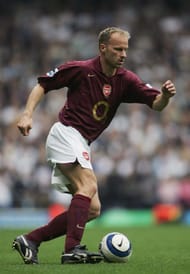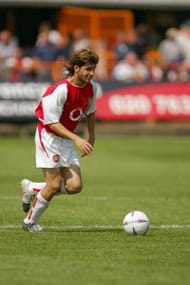Arsene Wenger is not called ‘The Professor’ for nothing. His entry into the Premier League in 1996 changed the way football was played in England. From long balls and boisterous defences, the game was transformed to accommodate skill and finesse.
What was Arsenal’s state of affairs when Wenger arrived at the club?
When Wenger took over from Bruce Rioch, Arsenal had finished the 1995/96 season in 5th position. Manchester United had won the league and Manchester City were relegated.
Fast forward to 2018, and the battle in Manchester seems topsy-turvy. Doesn’t it?
But we’re on a journey back in time to discover what made Wenger so famous in the Premier League. Was it his footballing acumen or his courage to play a style of football that was alien to clubs in the U.K.?
Truthfully, it was a mix of both. Remember the days of Marc Overmars and Dennis Bergkamp who could thread balls through gaps that weren’t visible to our eyes? The idea of one touch football was seldom employed in the English game before Wenger took over at Arsenal.
But it proved to be decisive as Arsenal won the Premier League in 1997/98. They also won the FA cup in the same year to complete the double and prove that they were a force to be reckoned with over the next few seasons.
What happened after winning the title?
Following the trophy winning season, Wenger ushered in a boatload of French players who were adept at playing the quick passing game around the opposition box until they found an opening to present the striker with a chance to score.
The likes of Robert Pires and Thierry Henry were brought to England, which strengthened the squad immensely. They went on to win 2 more Premier League titles in the years that followed. They also created history by becoming the only team to go the entire season without losing a match in 2003/04. ‘The Invincibles’, as they were called, had taken Arsenal to a new level.

The Slump
A couple of years later, Arsenal moved to their new home ground – the Emirates Stadium. It was the start of Arsenal’s downfall. In 2007, Stan Kroenke and Alisher Usmanov acquired a significant share in the club. It was another terrible move from Arsenal's perspective. Kroenke’s greed for wealth ruined the club, as transfer budgets were stifled and the club was forced to sell their best talent to rivals in the Premier League.
From Ashley Cole’s transfer to Chelsea, to Van Persie’s transfer to Manchester United, and a host of players that left Arsenal to join Manchester City in between, Arsenal was ruined.
Blame Wenger all you want, but he was helpless, as the owner ran the club to the ground. In August of 2018, Kroenke purchased Usmanov’s shares to become sole owner of Arsenal. It was probably the last nail in the club’s coffin. Surely, Wenger’s last few years at the club were dismal, but he wasn’t all to blame.

The departure of Patrick Vieira was a huge blow for Arsenal, one from which they never truly bounced back. It can be argued that Wenger sold Vieira, and had planned to nurture Fabregas into Arsenal’s next leader. However, the midfielder followed Henry to Barcelona and Arsenal could do nothing to stop the move.
Since his departure, Arsenal haven't found a leader. Arsenal’s biggest problem is the lack of leadership, which was evident in the Europa League final where they were battered by cross-town rivals Chelsea.
A tribute to Arsenal’s most successful manager
Truthfully, Wenger was a great asset to the club. He dwindled during the last few seasons of his reign, but Kroenke must be assigned equal blame, if not more. Wenger’s football acumen was second to none. Even his fiercest rival, Sir Alex Ferguson, paid tribute to him before his retirement.
The Arsenal faithful will have nothing to say but ‘Merci Wenger’ for all that he has done for Arsenal F.C.
